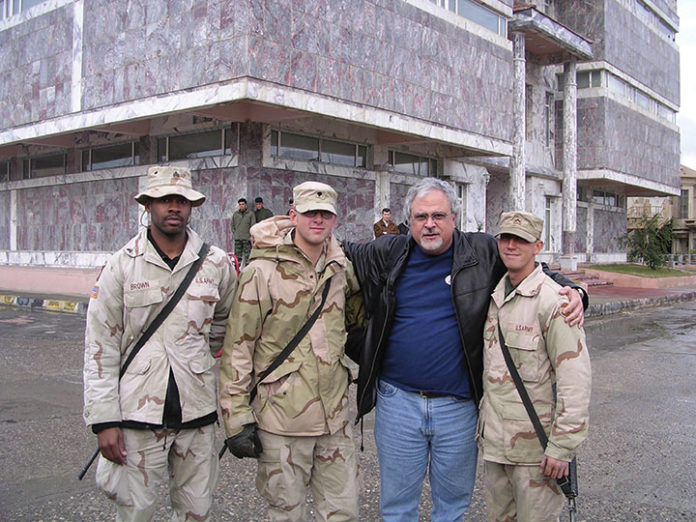
By Phoebe Suy | Staff Writer
In the wake of the start of the Iraq war in 2003, members of Baylor faculty and staff traveled to Iraqi Kurdistan to present higher education workshops to professors and students who remained in the war-torn region. Members of the team reunited on Thursday to share their stories at “Education Goes to War.”
Retired U.S. Air Force colonel and Baylor professor emeritus of political science William A. Mitchell led the effort, known as “Operation Baylor in Iraq.” The first expedition took place in 2003, and the fifth and final journey was in 2007.
Mitchell’s book, “Baylor in Northern Iraq During Operation Iraqi Freedom: Journeys to Dohuk for Higher Education, Democracy, and Voices for Survivors,” documents the five educational missions.
“Many Baylor alumni and faculty served in the military during the war,” Mitchell said. “But few civilian non-combatants had the opportunity to work in a war environment while representing Baylor University. I know we will not be the last.”
Volunteers on the December 2003 trip to Turkey and Iraq included 18 Baylor professors, two members of the Consortium for Global Education and two graduate students. Mitchell said the team learned of Saddam Hussein’s capture on the way to the DFW airport.
The operation’s initial goal was to learn how to assist the Kurds in rebuilding their higher education system, Mitchell said. However, their efforts soon expanded from conducting educational workshops to establishing a center for democracy at Dohuk and providing outreach to refugees.
According to Mitchell, the greatest challenge to higher education in Iraq was terrorism toward academia. Hundreds of professors were murdered, thousands fled and students were attacked and killed, Mitchell said.
“I’m proud to be a part of the Baylor family who walk the talk and help our neighbors in need,” Mitchell said. “We do this every day on our campus, we do it in our city, we do it nationally, but of course, we should continue to do it internationally.”
Members of the panel from Mitchell’s expeditions included: Cindy Fry, senior lecturer of computer science; Dr. Mark Long, director of Middle East Studies and associate professor of BIC; Dr. Brad Owens, senior lecturer of journalism, public relations and new media; and Dr. Lyn Prater, clinical professor at Louise Herrington School of Nursing.
“You have opportunities to join with God in the work that He’s already doing every day, and a lot of times, the opportunity is easy to say yes to,” Fry said. “But this was an opportunity that came up that was not the easiest thing to say yes to because it was pretty risky. It was still a war zone.”
Fry said the expedition opened up her eyes to the reality of what was going on in the world around her. Fry specifically worked with engineers and computer scientists from local universities. She described some of the classrooms as simple, with wooden chairs, no desks and maybe a chalkboard.
“How do you talk about data structures or networking when they don’t even have computers?” Fry said.
Through her experiences engaging with her Iraqi colleagues, Fry said she learned that sometimes we rely too much on technology.
“We need time and space just to think about how to solve a problem, how to formulate a solution,” she said, “and you don’t need a machine or technology to do that.”
The panelists emphasized they were going to Iraq to engage with colleagues, not just to be “American heroes.”
Owens said they spent a lot of time speaking with and listening to their fellow academics and scholars. They discussed problems they experienced, teaching strategies and potential ideas, among other things.
“It was absolutely in our minds that we could get shot for teaching the wrong thing. Some of that had happened in the room we were in,” Owens said.
Long shared a moving account of former Baylor professor Dr. Carol King, who retold the story of Homer’s Iliad to a seminar consisting of Arabs, Kurds, Americans and one Canadian. In the last book of the Iliad, Priam, King of Troy, begs permission to ransom his son’s body.
“The old king, broken but noble bowed before Achilles, touched his knees and then kissed the hand of the man who killed his son,” Long recounted.
In complete silence, a woman in the seminar called out, “Why?”
Long said he’s thought about that moment ever since.
“In this polyglot, polycultural audience, we listened to a story millennia old and ask the question ‘Why?’” Long said. “That’s what we do with education, but it also told me about the commonality of human experience.”
Prater said she joined the team toward the end, six weeks before the trip to Dohuk. As she worked with the medical team, Prater said one of the most provocative moments for her was hearing the story of two nurses. When the war caused nearly all the villagers to flee to the mountains, the nurses stayed back in the hospital to keep the babies alive on the monitors and in the incubators.
“Being able to stand in solidarity with my nurse colleagues around the world in those times was just amazing,” Prater said with tears in her eyes.
Owens said there remains a very powerful bond formed between the team members. Formed on long hours in airports and a legendary bus ride, Owens said these things are worth looking back on ten years later or longer.
“You may cast about your whole life looking for a leader you can really trust on a number of different levels,” Owens said.





